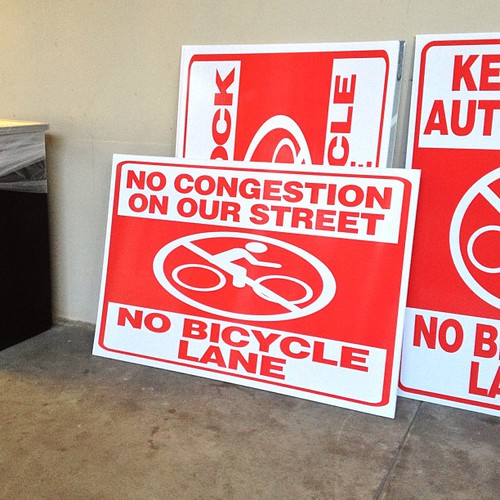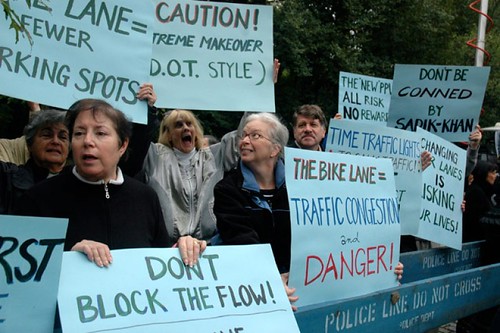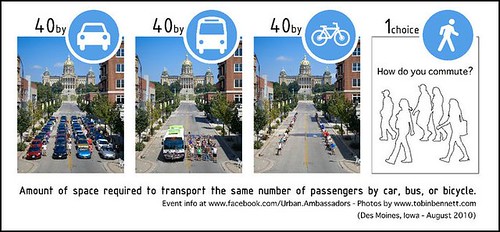The "war on cars", the "war on bicycling", the war on parking, etc. is actually competition for the use of street and public space
There has been a spirited response in Washcycle/Greater Greater Washington ("Cyclists are special and do have their own rules") to The Atlantic Cities piece, "Cyclists Aren't 'Special', and They Shouldn't Play by Their Own Rules." about how bicyclists need to follow "the rules" in order to be accepted by motor vehicle operators. From the article:
The flip side is that in places like Chicago, they have also been ticketing bicyclists for violating laws. In New York, the Department of Transportation has deployed safety officers on busy bike routes to remind people of the right way to ride. Ticketing blitzes seem to be happening more regularly.
This is what has to happen for things to get to the next level.
Image from the EastsiderLA blog, "Northeast L.A. bike lane battle spreads to business community."
I come down on the side of Washcycle.
My position on differential rules of the road for bicyclists has been discussed here many times, based on both the physics of movement and the physics of traffic volume--bikes are smaller and take less space, but are slower.
It's the way it works in the Netherlands, where motor vehicle operators are required to take more care than is required in the US, based on the reality that motor vehicles are bigger and faster and more dangerous, and therefore operators need to be held to a high level of responsibility for their actions.
I am fine with tickets for bicyclists "blowing through stop signs" when there is oncoming traffic or for riding against traffic (which doesn't happen as much as people say). But otherwise I believe that the Idaho Stop should be legalized first.
But a legalized Idaho Stop and better training for both bicyclists and drivers, and stepped up enforcement against bicyclists (but why not stepped up enforcement and prosecution for motor vehicle operators too?), won't lead the bulk of non-bicyclist motor vehicle operators (and I've been hit by a vehicle with a "I'd rather be biking" bumper sticker) to all of a sudden want to "share the road" with bicyclists.
There may not be a war on cars but there is a battle for how best to mediate between the conflicting and competing demands for the use of scarce space on streets and roadways.
Do we continue to privilege space for motor vehicles, or do we divvy it up better, between bicycling, transit, traffic throughput, car storage, car sharing, etc.?
In cities specifically, where sustainable modes are far more likely to have primacy, this is an increasingly heated discussion.
This is about the contestation of space pure and simple.
-- Change.org petition against bike lanes
 Right: image of an anti-bicycle lane yard sign from the Flying Pigeon blog, Los Angeles. "NELA bike lane controversy comes to NCs this week."
Right: image of an anti-bicycle lane yard sign from the Flying Pigeon blog, Los Angeles. "NELA bike lane controversy comes to NCs this week."The reality is that it's bunk that if all of a sudden bicyclists followed all rules (and if we did, vehicle throughput of all types would be significantly reduced--taking the lane, etc., because face it, bicycles are slower than cars) then motor vehicle operators would miraculously be all right with giving up what they consider to be their "right" of being privileged in the use of streets and public space.
It might not be "a war on cars" (see the City Paper article) but it definitely is a battle over who is using public space--streets and more (especially for low cost or no cost parking).
 Left: protest against the Prospect Park West bicycle lane, Brooklyn. Photo by Zoe Schlanger from The Gothamist.
Left: protest against the Prospect Park West bicycle lane, Brooklyn. Photo by Zoe Schlanger from The Gothamist.There is no question that for decades, motor vehicles have enjoyed privileged use of the space, and now that's being challenged. They don't like it, and this is why the argument is so heated.
The aggravation with bicyclists is over their perceived and real impediment vis-a-vis cars.
The funny thing is that if motor vehicle operators want fewer impediments, they ought to be the foremost advocates for separated infrastructure, instead of being the biggest opponents.

Labels: car culture and automobility, contested spaces, sustainable transportation, traffic engineering, traffic safety and enforcement, transportation planning, urban design/placemaking, urban sociology




2 Comments:
my bet is that a lot of anti bike lane activism is really vehicular cyclists foaming at the mouth
This is a great post.
This post shares information about competition for the use of street and public space.
Post a Comment
<< Home